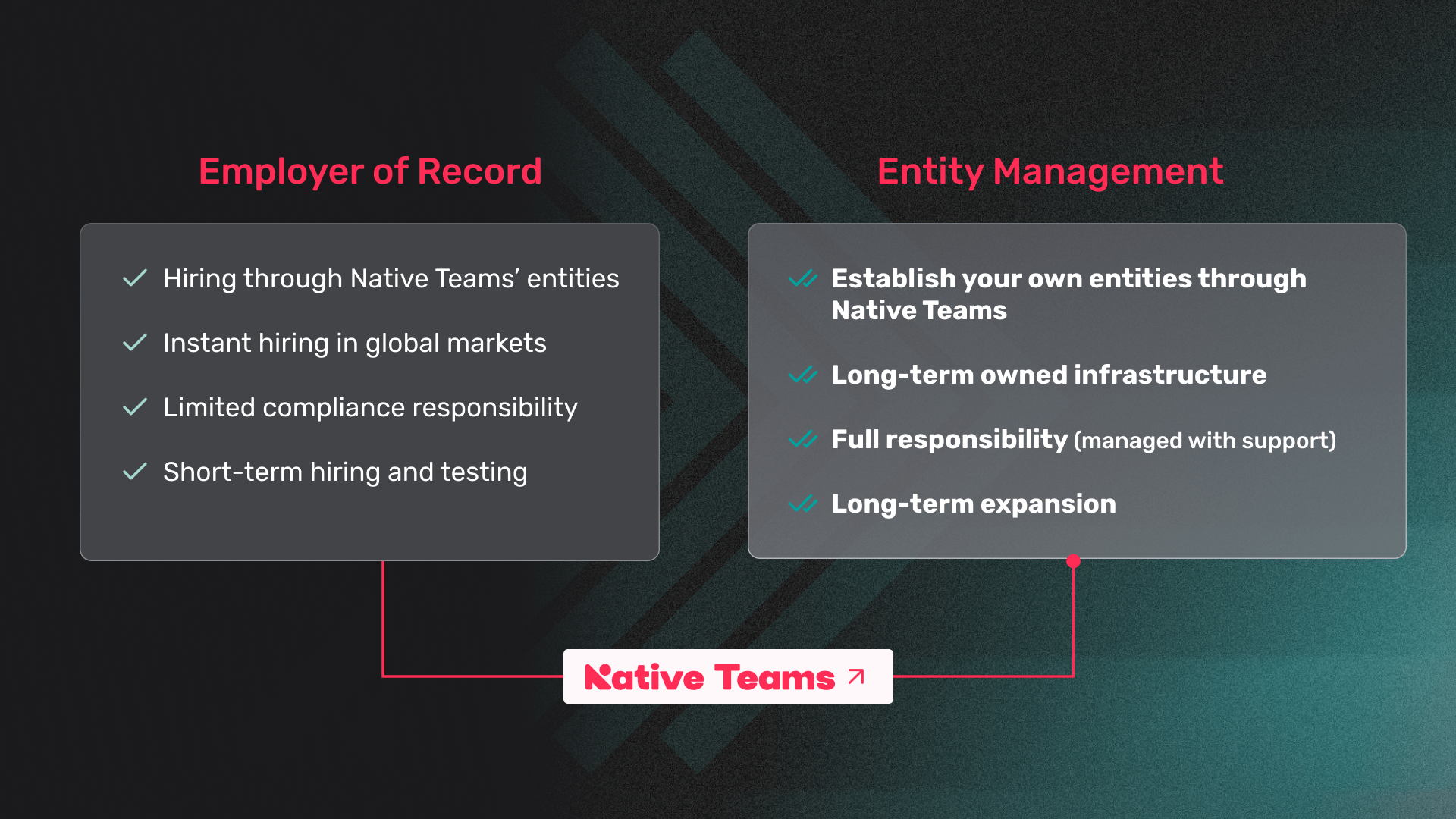Like many people worldwide, I have worked remotely for over a decade, so I'm always interested to learn about software that makes my life easier.
Native Teams is a global platform that makes it easy to handle work payments and employment. It's built to support both companies and the people behind them.
More than just an Employer of Record (EOR), Native Teams offers end-to-end tools for hiring worldwide, expanding into new markets, and managing multi-currency payments for employees and freelancers — while staying fully compliant.
With Native Teams, businesses can get more out of every dollar and cut down on admin work thanks to simple, scalable solutions. Already trusted by 3000+ companies in over 85 countries, Native Teams makes global employment straightforward, compliant, and people-first.
Today Native Teams launches Entity Management – the all-in-one solution that enables businesses to set up, manage, and control multiple entities from a single dashboard. It also helps significantly cut expansion costs and simplify compliance workflows across markets.
I spoke to Jack Thorogood, founder and CEO of Native Teams, to learn about the biggest shifts, challenges, and opportunities in remote work.
Skills outweigh geography in remote work era
Since its founding in 2020, Thorogood has observed three levels at which changes have been most significant: the employee level, the employer level, and even the country level. From an employee perspective, the barriers to good remote jobs have come down a lot. People can now work from anywhere and still expect to find high-quality jobs.
"Before, there was more of a trade-off between location and the quality of jobs available. The pandemic really accelerated that shift,” he shared.
From the employer's perspective, there is now a much greater understanding that location matters far less than it used to.
He admits, “You still see the occasional story about a big company forcing people back into the office, but generally employers recognise that if the internet connection is stable and communication skills are strong, location is irrelevant."
"Even time zones are less of a barrier than before. For example, my co-founder recently spent a month working from Vietnam — starting her day on the beach, then working seamlessly with the rest of the team.”
At the country level, Thorogood has seen a narrowing of pay gaps over the last 15 years. While salaries are still not the same everywhere, the gap has decreased, especially for certain roles and levels of responsibility. Location is increasingly disconnected from salary. I remember the first time I visited Ukraine — a developer picked me up in a Maserati because he was being paid US wages. That's no longer the case; wages have evened out.
According to Thorogood, the same has happened in India.
“It’s one of the biggest benefits of distributed teams and gig work — it has improved quality of life and increased tax receipts in many countries.
If you look at the world through the lens of the greatest good for the greatest number, and people’s lives are improving, then this shift is hugely positive.”
According to Thorogood, these changes couldn't have happened without the rise of software to support them. “It's a bit of a chicken-and-egg situation: the demand for better tools drove developers to build them, and the existence of those tools made remote work easier. Many of the categories of tools have been around for years, just under different names. Today we use Slack, Google Workspace, and Asana."
"Back when I started, we were using ICQ, then Skype, and Basecamp instead of Asana. The point is, as long as the tools are cloud-based, they enable remote work.”
Thorogood contends that the limitations usually come from companies that are still tied to on-premises software.
“That creates friction: either it slows their transition to distributed work, or it makes remote workers feel like second-class citizens because they can’t access certain systems unless they’re physically in the office.”
He believes that looking ahead, AI will play a big role in making remote work smoother.
“One of the biggest challenges is collaboration, and AI can help with better note-taking, automated action points, and smarter prompts after meetings.
These kinds of tools will make collaboration more seamless and remove some of the remaining frictions in distributed work.”
Addressing a common market gap
Workers today have more options and mobility than ever before. Freelancers want flexibility, and companies need to adapt. With this in mind, tax and employment classifications have always been a priority for Native Teams, according to Thorogood, “because the rules are always changing."
Freelancers who aren't on top of this risk falling foul of new regulations, and employers can run into issues too. Employers want flexible labour — and freelancers want flexibility.
"But neither side wants a freelancer to suddenly be reclassified as a full-time employee.”
This becomes even more challenging as companies scale.
As global hiring and company operations become standard practice, many companies struggle with the costly and complex challenge of managing admin and compliance across multiple countries.
Native Teams Entity Management gives much greater flexibility for global payments and operations, including setting up new legal entities and onboarding existing ones to the platform. This brings centralised management to international work payments, compliance and workflows, and also provides full control over businesses' global infrastructures.
Key Entity Management features
- New entity setup with full administrative and legal support.
- Onboarding existing entities into one streamlined and consistent dashboard.
- Centralised management of work payments, contracts, and compliance.
- Local advisory support for country-specific laws and regular monthly obligations.
- Benefits for global businesses.
- Owned employment structure in hiring countries.
- Greater visibility and control over the global workforce.
- Reduced long-term operational costs.
- Minimised legal risks.
According to Thorogood, Entity Management helps organisations as they scale, and their priorities shift towards more cost efficiency and operational control.
“Entity Management is purpose-built to support that evolution. We aim to be the right partner at the right time, helping our clients transition from fast, flexible solutions to more permanent, scalable setups as their needs change.
Our goal is to give our clients the right solution, and help them grow. When clients come to us asking for the most effective way to employ and pay their teams across borders, we're able to provide a much broader range of answers."

Solving the two sides of payments: movement of money and documentation
Years ago, most freelancers and remote workers relied on platforms like PayPal and lost money through conversions and fees. Native Teams offers a multi-currency wallet and payments system that lets businesses and freelancers easily send, receive, and manage money across borders. Users can hold and convert different currencies in one wallet, fund it via bank transfer, card, PayPal, or Payoneer, and pay employees or contractors worldwide — even in batches.
The platform provides IBAN/SWIFT accounts for seamless transfers, supports physical and virtual payment cards, and includes expense tracking with full transparency on fees, taxes, and salaries. This makes global payroll, contractor payments, and cross-border expenses simple, compliant, and efficient. Thorogood explained that payments really have two sides:
“First there physical movement of money. We focus on making that as smooth as possible, because it can still be a point of friction. Services like Wise and Revolut cover a lot of ground here, but we approached this from an employee-first perspective.”
He recalled that when Native Teams started in the Balkans, they saw how poorly smaller countries and currencies were served:
“Imagine you’re a Macedonian developer with a bank account in denars. With Native Teams, they can invoice in USD, convert with zero or minimal commission (depending on their plan), and receive the funds in local currency. That removes a lot of friction."
The second side is documentation. In many countries, an employee’s bank requires paperwork that explains where the money came from and in the right format. If the documentation isn’t provided, the money sits in limbo until the bank approves it. So localised documentation is just as important as the underlying payment rails. Without it, the payment can’t be completed.
The new digital divide
In the past, we talked about the “digital divide” — people who could manage technology versus those who couldn’t. Now there’s another divide: people who can thrive in remote work versus those who struggle.
Today many people start their careers as remote workers. However, Thorogood contends that not everyone has the skills to succeed in a remote environment:
“It’s not about technical ability — it’s about communication, self-management, and being able to pick up nuance over video calls," he shared.
“Some people simply aren’t equipped for that, and it becomes obvious when they join a distributed team. I’ve never seen a course that truly prepares people for remote work expectations.
That’s something education systems should consider.”
From 15 to 300: How Native Teams scaled culture with intentionality
Another issue for remote teams is culture. If a company isn’t remote-first, people working outside the head office often become second-class citizens.
Thorogood raises an important point: the difference between a “remote team” and a “distributed team” is important. In a distributed setup, everyone’s in the same boat, with no single headquarters. Companies that succeed with distributed teams make deliberate efforts to build inclusion and collaboration.
According to Thorogood, at Native Teams, intentionality has been critical.
“We started during lockdown with about 15 people, and now we’re over 300. To keep culture strong, we’ve run virtual social calls, in-person retreats in Greece, and regular check-ins.
At first, some of these initiatives — like video calls where everyone introduced their pets or shared something personal — felt awkward. But they built camaraderie and trust."
Every year, Native Teams brings teams together in small groups. It’s not cheap, but the benefits far outweigh the cost.
“People get to know each other as individuals, and collaboration improves afterwards.”
Culture also comes from the founders. “A lot of our DNA as a company reflects how my co-founder and I work. If you don’t shape culture deliberately, subcultures form on their own, and not always in ways you want,” contends Thorogood.
As the lines between geography, skills, and opportunity continue to blur, companies that prioritise flexibility and compliance will gain the edge. Native Teams’ growth shows that making global work simple isn’t just about payroll or paperwork — it’s about enabling people to thrive wherever they are.
Lead image: Jack Thorogood, founder and CEO of Native Teams. Photo: uncredited.



Would you like to write the first comment?
Login to post comments